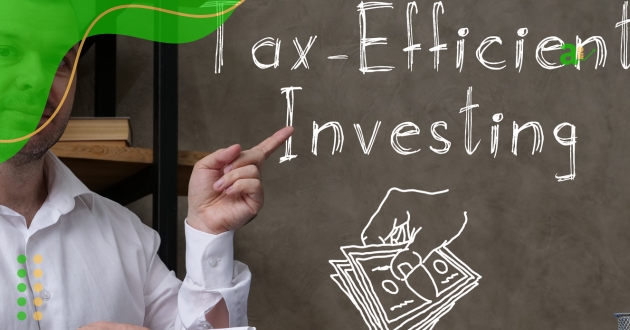Tax efficient investing tips are essential for anyone looking to grow their wealth while minimizing their tax burden. Whether you’re a seasoned investor or just getting started, understanding how to structure your portfolio for tax efficiency can make a significant difference in your financial journey. Many people unknowingly lose a large portion of their returns to taxes, which can be avoided with proper planning.
Moreover, tax efficient investing tips are not just about reducing your tax liabilities today but also about planning for the future. For instance, utilizing tax-advantaged accounts like Roth IRAs or 401(k)s ensures that your investments grow without unnecessary interruptions. These strategies are especially critical for those aiming to build long-term wealth while keeping their financial plans sustainable.
In real-world scenarios, tax efficient investing tips have saved individuals thousands of dollars. For example, John, a middle-aged investor, restructured his portfolio to include municipal bonds and tax-efficient index funds, significantly reducing his annual tax bill. By implementing similar strategies, you too can retain more of your hard-earned money while optimizing returns.
5 Efficient Tax Investing Tips
1- Take Advantage of Tax-Advantaged Accounts
Using accounts like Roth IRAs, traditional IRAs, and 401(k)s can significantly reduce your tax burden. These accounts allow your investments to grow either tax-deferred or tax-free, depending on the account type. Over time, this strategy helps you maximize your wealth while minimizing tax obligations.
2- Invest in Municipal Bonds
Municipal bonds are an excellent option for generating tax-free income. The interest earned on these bonds is exempt from federal taxes and, in some cases, state taxes. This makes them particularly appealing for investors seeking consistent returns without the added burden of high taxation.
3- Practice Tax-Loss Harvesting
Selling investments at a loss can help offset capital gains on other assets, reducing your overall tax liability. This strategy can be used annually to optimize your portfolio’s tax efficiency and ensure that you’re not overpaying in taxes on realized gains.
4- Allocate Investments in Tax-Appropriate Accounts
Assets that generate high taxable income, such as dividend-paying stocks and interest from bonds, should be placed in tax-advantaged accounts. By doing so, you shield your passive income from excessive taxation, ultimately boosting your net returns.
5- Choose Index Funds and ETFs
Index funds and exchange-traded funds (ETFs) are known for their tax efficiency. Due to their lower turnover rates, they generate fewer taxable events compared to actively managed funds. This makes them a strategic choice for investors aiming for long-term growth with minimal tax impact.
Investing in Municipal Bonds in the United States

Municipal bonds, commonly referred to as “munis,” are issued by state, municipal, and other local governments in the U.S. These bonds are used to finance public projects such as schools, hospitals, infrastructure, and roads. One of the main advantages of these investments is that the interest is often exempt from federal taxes and, in some cases, from state and local taxes as well.
Investing in municipal bonds is a popular strategy for those seeking stability and tax benefits in the United States. Among the options, General Obligation (GO) Bonds stand out as they are backed by the issuer’s taxing power, such as cities or states. Moreover, the interest on many municipal bonds is exempt from federal taxes and, in some cases, state and local taxes, making them even more appealing.
Understanding Tax-Efficient Accounts: Tax Efficient Investing Tips
One of the foundational tax efficient investing tips is leveraging tax-advantaged accounts. Examples include Roth IRAs, traditional IRAs, and 401(k)s. These accounts allow your investments to grow tax-free or tax-deferred, depending on their structure. For instance, contributions to a traditional IRA are tax-deductible, reducing your taxable income immediately. However, you will pay taxes on withdrawals during retirement.
Conversely, Roth IRAs work differently but are equally beneficial. With Roth accounts, you contribute after-tax dollars, but withdrawals in retirement are entirely tax-free. Imagine the impact of a tax-free income stream during your golden years! For someone like Sarah, a young professional who maxes out her Roth IRA every year, this strategy ensures she builds a robust, tax-free retirement fund.
The Importance of Tax-Loss Harvesting: Tax Efficient Investing Tips

Another practical example of tax efficient investing tips is tax-loss harvesting. This strategy involves selling underperforming investments to offset capital gains from successful ones. For instance, if you earned $10,000 from selling stock A but lost $3,000 on stock B, you would only be taxed on $7,000 of gains.
This approach is particularly effective during market downturns. By actively managing your portfolio and harvesting losses, you can lower your tax liability while positioning your portfolio for recovery. James, a tech investor, managed to save $5,000 in taxes during a volatile market year by employing this strategy.
Dividend and Interest Income Management
Managing dividend and interest income is another crucial aspect of tax efficient investing tips. High-dividend stocks, while attractive, can lead to significant tax liabilities if not placed in the right accounts. For example, holding dividend-paying stocks in a tax-advantaged account can shield this income from taxation.
Additionally, municipal bonds are an excellent tool for reducing tax exposure. These bonds are exempt from federal taxes and, in many cases, state taxes as well. Emily, a retiree, diversified her portfolio with municipal bonds, ensuring a steady income stream while minimizing her tax obligations.
Index Funds and ETFs: A Tax-Efficient Choice
For those seeking simplicity, index funds and exchange-traded funds (ETFs) are a great option. These funds are inherently tax-efficient due to their low turnover rates. Unlike actively managed funds, which frequently buy and sell assets, index funds mirror a specific market index, reducing taxable events.
For example, Peter shifted his investments from high-turnover mutual funds to low-cost ETFs, cutting his tax liabilities in half. This simple switch not only saved him money but also made his portfolio easier to manage.
Real Estate and Tax Efficiency Investing Tips
Real estate investments also offer unique tax benefits. For instance, rental property owners can deduct depreciation, maintenance costs, and mortgage interest from their taxable income. Additionally, real estate investment trusts (REITs) provide exposure to the real estate market while offering favorable tax treatments.
Consider Martha, who owns several rental properties. By leveraging deductions and using a 1031 exchange to defer capital gains taxes when selling a property, she significantly reduced her tax burden while growing her real estate portfolio.
The Role of Professional Advice
While these tax efficient investing tips are actionable, consulting a financial advisor can further refine your strategy. A professional can help identify overlooked opportunities and ensure compliance with tax laws. For instance, a financial advisor might recommend specific investments based on your income bracket and long-term goals.
Tom, a busy entrepreneur, relied on professional advice to transition his portfolio into a more tax-efficient structure. This move not only saved him money but also freed up time to focus on his business.
Common Mistakes to Avoid: Tax Efficient Investing Tips
While pursuing tax efficiency, it’s crucial to avoid common pitfalls. For example, over-concentrating on tax benefits without considering overall investment performance can backfire. Additionally, failing to diversify your portfolio or neglecting to adjust it as your financial situation changes can diminish returns.
Jessica, an investor focused solely on minimizing taxes, missed out on high-growth opportunities in emerging markets. Striking a balance between tax efficiency and growth potential is key to long-term success.
Conclusion: Making the Most of Tax Efficient Investing Tips
Implementing tax efficient investing tips is not just about saving money but also about creating a sustainable financial future. By leveraging tax-advantaged accounts, practicing tax-loss harvesting, and making informed investment choices, you can maximize your returns while minimizing liabilities.
Incorporating these strategies into your financial plan can be transformative. Whether you’re a novice or an experienced investor, staying informed and proactive ensures your portfolio remains aligned with your goals. With careful planning and the right tools, you can take full advantage of tax efficiency, securing a brighter financial future.
For millennials looking to secure their financial future, understanding how to make smart investment choices is key. Incorporating practical advice from Finance Tips For Millennials can help this generation build a strong financial foundation. From creating a budget that aligns with long-term goals to exploring diversified investment options like municipal bonds or low-risk funds, there are numerous strategies to optimize wealth. Additionally, millennials should focus on minimizing unnecessary expenses and leveraging technology, such as finance apps, to track and manage their money effectively, setting themselves up for lasting success.





